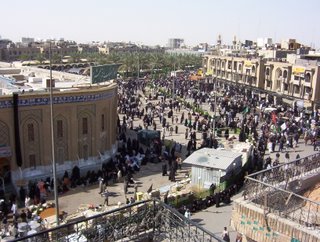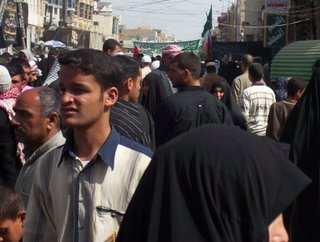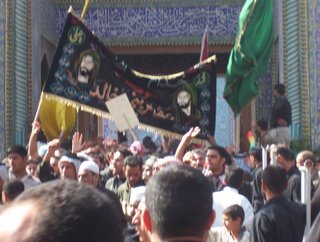
I am currently staying with a friend in the Sayyida Zaynab neighborhood of Damascus about 5 minutes from Sayyida Zaynab! (See picture) After all the times that I have wanted to come here in the past 8 years and find some peace in my life, I am really appreciating the opportunity to literally walk out the door and down the street and be in the picture to the left. I like living in the Sayyida Zaynab neighborhood. Primarily, I think I like it beacuse it is mostly Shi'a, and I don't feel out of place here. There are a lot of hawzah ilmiyyahs and bookstores selling books on Ahl Al-Bayt (as), and you can occasionally hear latmiyyah in the street. Plus, there are a lot of other non-Syrians here and people who speak Farsi, so I feel comparatively at home. The only downside is that prices have been a bit expensive due to the number of people who came from Iran, Lebanon, and the gulf countries for ziyarat, and I wouldn't advise drinking the water.
The rest of Damascus is nice too, but I'm not sure I would like living in another neighborhood.
Coming from America, I can't help but reflect on the differences between Syria in America. As in America, most people here are unhappy with and concerned about the economy, but, unlike in America, there is a general sense here of trying to make the best of what you have. In contrast, in America -- particularly in Houston -- I always felt there was this general sense of misery and despair. I always felt it was somewhat ironic that in one of the richest countries of the world, I was afraid to roll down my windows while driving or walk down the street alone. Being outside of that sort of environment really makes you realize how unnatural it is.
I am also appreciating the social aspect of living in the Middle East. In America, life is so busy that we rarely have time to see anyone we know outside of our housholds more than once a week. Here, it is relatively easy and not unexpected to drop in on people. It is too bad that we in America cannot regain the part of our culture that used to go calling on neighbors, family, and friends.
It is very peaceful also being able to walk a land which prophets walked. A while back I went to the mountains and visited my great-grandfather (or great-uncle, or most likely both) Habeel. We have no connection with any of our roots in America. There is a sense of peace and spirituality in the land which I don't find in America (particularly in Texas).
Being an American Muslim woman in Syria is another story. I learned very quickly here not to tell the average person on the street that I was American. My first day here, I went to go use a public phone, and while I was sitting there trying to figure out how to use my phone card, a lady came up and asked me if I had change. I said no, and she promptly went to the next phone both and told the lady about the foreign lady at the phone next door. They called their friend over, and before I knew it there were about fifteen ladies surrounding the foreign lady in the phone booth, staring and asking me questions. I could have handled it much better than I did, but I didn't. When I realized I was literally trapped in the phone booth, I panicked and just took off running.
Since then, on the street, I am Iranian. (For some reason people actually seem to believe this) However, of course I am still telling people I know that I am American. People are very curious to know that there are indiginous Muslims in America, and they are always asking how I became Muslim. I always got these questions in America too, but here they do seem more credible since I probably AM the first American Muslim most of these people have ever seen. Some of the Shi'a Muslims I have met here have in particular wanted to know about English latmiyat, and I had the new experience of reading an English noha at a majlis where I knew that the women spoke little to no English at all. I was surprised to find them following and repeating, and even after the majlis they were taking apart the lyrics.
I have also realized where what a small world it is. There is a truck that drives around our street playing "It's a Small World" on a loudspeaker, and while I don't know if the vendor knows what that song means, I sure do. I had always thought that the Shi'a community in America was close because it was small. I now realize that this is a worldwide phenomenon. So far I have run into FOUR people that I knew from America. I think that is a rather large number for a foreign country. In addition, I met someone the other day who has to be the largest hub of knowledge I have ever met in my life. Despite the fact he has never been to America, when I said I was from America, he began rattling off many names of people I knew (and many interesting facts about them which I never knew either). I suppose now I, the American Muslim, am part of his library.
For the Spanish-speaking brothers and sisters: I wanted to mention that I met an Afghani sheikh today who spoke fluent Spanish (and was surprised that I didn't). I should have gotten his contact information so you could speak to him, but I am sure I could locate someone who knows him if you would like to meet him!











